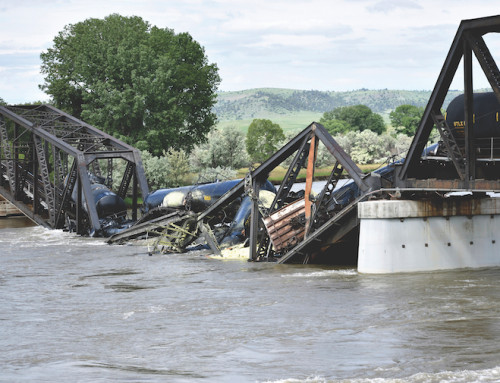PROVIDENCE, R.I. (AP) — The developer of an offshore wind farm that would power 350,000 homes in Rhode Island and Connecticut last week sued the Trump administration for halting its construction.
Danish energy company Orsted said it filed a lawsuit in U.S. District Court in the District of Columbia arguing that the administration lacks the legal authority to block the Revolution Wind project.
Orsted said it would seek a preliminary injunction that would allow it to move forward with the project, which is 80 percent complete, with all underwater foundations and 45 of 65 turbines installed.
Interior Department spokesperson Elizabeth Peace said that the department doesn’t comment on pending litigation. Work on the project was paused on Aug. 22 when the Bureau of Ocean Energy Management issued a stop work order for what it said were national security concerns. It did not specify those concerns.
Revolution Wind is the second major wind project that the Trump administration has ordered work to stop. The first, an offshore wind project for New York, was later allowed to resume construction.
In separate recent federal court filings, the administration said it was reconsidering approvals for three other wind farms: the Maryland Offshore Wind Project, SouthCoast Wind and New England Wind. Combined, those projects could power nearly 2.5 million homes in Maryland, Massachusetts and Rhode Island with wind-generated electricity.
When it approved Revolution Wind in 2023, the Bureau of Ocean Energy Management said it consulted with the Defense Department at each stage of the regulatory process for the lease area assigned to the wind farm.
The DOD concluded that with some site-specific stipulations, any impacts to its training and activities in the wind energy area would be “negligible and avoidable,” according to the record of decision.
The state and federal reviews took about nine years.
Revolution Wind was expected to be Rhode Island’s and Connecticut’s first large offshore wind farm, capable of providing about 2.5 percent of the region’s electricity needs.
Orsted began construction in 2024 about 15 miles south of the Rhode Island coast. Rhode Island is already home to one offshore wind farm, the five-turbine Block Island Wind Farm.
Rhode Island and Connecticut have said that halting construction of Revolution Wind would harm the states, their residents, investments and the offshore wind industry.
More than 1,000 people have been working on the wind farm, and Connecticut committed over $200 million to redevelop State Pier in New London to support the industry.
The states said they’re counting on the electricity from Revolution Wind, particularly in the winter, when demand in New England spikes and natural gas is prioritized for heating. The power would cost 9.8 cents per kilowatt-hour, locked in for 20 years. That’s cheaper than the average projected cost of energy in New England.
The head of Connecticut’s top environmental and energy agency, Katie Dykes, predicts it will cost the state’s electricity ratepayers tens of millions of dollars if the wind project doesn’t come online. She also noted the risk to electricity reliability in New England cited by the region’s independent system operator.
Interior Secretary Doug Burgum told CNN that he’s concerned offshore wind turbines distort radar detection systems, which could give cover to a bad actor to “launch a swarm drone attack through a wind farm.”
Retired U.S. Navy Cmdr. Kirk Lippold called that a “specious and false narrative” pushed by someone with an “overactive imagination in search of a solution to a problem that doesn’t exist.” Lippold was commanding the USS Cole when al-Qaida attacked it in a Yemeni port in 2000.
If drones get that close to United States shores to be near a wind farm without being detected by the military, he said, “we have had a massive intelligence — a national security — failure.”








